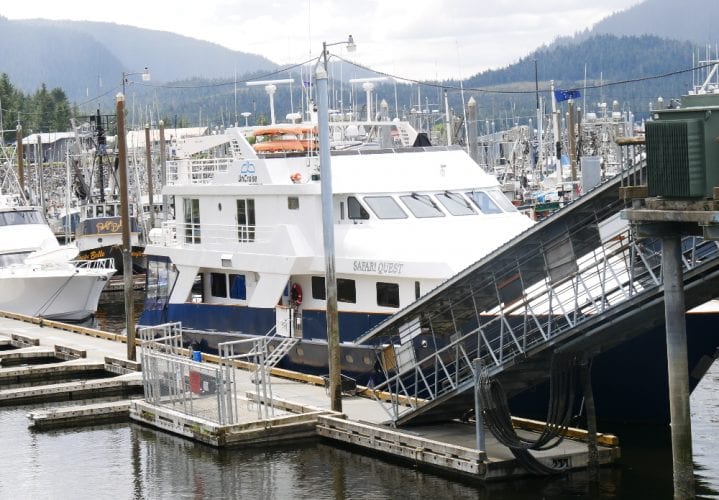
The Petersburg Borough has no local laws specifically against small cruise ships discharging waste water near town. The borough has a regulation against dumping materials in its harbors but it’s general in nature and there are no fines attached to it. As Angela Denning reports, that could change after discussions at the last borough assembly meeting.
Petersburg’s small cruise ship industry is growing; small meaning between 50 and 250 passengers. In the summertime, you can often see the visiting ships docked at the harbor and tourists walking around downtown.
But what are the laws for those boats discharging their waste water?
It depends. The federal and state governments can permit vessels to discharge gray water, which comes from sinks, showers, and laundry and black water, which is sewage. Many vessels can dump gray water near Southeast communities. Boats are also permitted to dump treated sewage in other waters of the region.
Petersburg’s Harbor Master, Glorianne Wollen, says the permits vary by boat depending on their size and equipment on board.
“They are each specific to the vessel,” she said.
Wollen was speaking to the borough assembly at their meeting.
The issue came up after recent complaints to the assembly about waste water discharges in the harbor and nearby Frederick Sound. In July, the Safari Quest dumped some sewage into the harbor, which they said was an accident. The ship’s company, UnCruise, said there was a mechanical failure. But Petersburg mayor, Mark Jensen, said he doesn’t buy that.
“It wasn’t accidental,” Jensen said. “They were approached by the person on duty from the harbor staff and they said they were permitted to dump their sewage anywhere they wanted, basically.”
Jensen’s not alone. A few residents voiced their concerns to assembly on the cruise ships discharging near town. Whether it’s black water or gray water, they don’t like it.
Here’s David Whitethorn:
“They’re dumping it where we eat clams, they’re dumping it where we eat our crab, our fishing industry can’t survive this and that’s what’s floating this community,” he said.
Resident Marc Martinsen said he has witnessed sewage dumping first hand. He said he is the chief engineer on a 170-foot cruise and charter boat.
“And the amount of sewage, you wouldn’t believe it. I mean, it’s appalling what goes into the harbor, right in the harbor and outside,” Martinsen said. “I mean, the septic systems in these boats are beautiful systems when they work but they hardly ever work and I’ve witnessed mass amounts of raw sewage in the harbor and outside the Narrows.”
The residents asked the assembly to create laws about discharging locally. Mayor Jensen said the borough should come up with its own position on the issue apart from state and federal permitting.
Harbor Master Wollen agreed, saying, “It would sure be nice to have a set of regulations for me to be able to try and enforce something.”
Assembly member Jeff Meucci suggested the borough start with a letter to the cruise industry, stating that although they might have a permit to do so, the borough doesn’t want them discharging near town.
“Making sure that they understand that it’s not appreciated to dump gray water in our borough,” he said.
The local coordinator of the visiting cruise ships, Dave Berg, agreed. He’s the owner of the travel agency, Viking Travel, and although he maintains that the recent Safari Quest sewage dumping was accidental, he said the borough should come up with its own laws.
“I’m certainly in favor of the community coming forth with some regulations regarding discharge of anything in our harbors,” Berg said.
Berg suggested coming up with fines attached to local dumping regulations of waste water and said the cruise companies would follow them.
“They would acknowledge that and make provisions to do their dumping elsewhere where it’s permitted,” Berg said.
Harbor Master Wollen is part of a volunteer tourism group that was formed last year to look at the future of the visitor industry in Petersburg. She said that group is talking about the issue of cruise ship waste water and will give the borough a recommendation on what could be done.
She said she’s also reaching out to other communities that see small cruise ships coming to town to see what local laws they might have in place.










